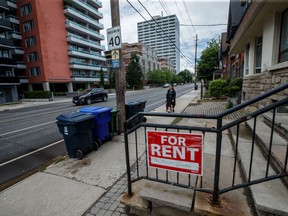Gap between new renters and those in units for more than a year most prominent in cities where rent increases regulated

Article content
A yawning gap in average rent between newly rented and already occupied units is adding to concerns about housing scarcity in the country, according to a report from the Canada Mortgage and Housing Corp.
Advertisement 2
Article content
The June 22 report show that rents paid on two-bedroom units rented over the past year in the major metropolitan areas of Toronto and Vancouver are on average about $500 above the rents for units occupied for more than a year.
Article content
“Given the population projections (according to which Canada’s major cities will see sustained population growth), the gap is all the more compelling,” the CMHC report said.
The report found that the rental gap is particularly prominent in cities where vacancy rates are already low and rent increases are regulated by guidelines. Rent restrictions mean property owners often must wait for turnover periods to adjust rents to align with current market prices and offset expenses such as repairs and renovations. Toronto, Vancouver and Montreal — where the gap is closer to $250 — all have rent guidelines.
Article content
Advertisement 3
Article content
In Calgary and Edmonton, where rental increases are not subject to regulatory guidelines, the average rent gap is considerably narrower, at $50. This finding suggests that a more flexible rental market allows for a relatively smaller discrepancy between rental prices, as property owners have greater freedom to adjust rents based on prevailing market conditions.
The average price of newly rented units is one of two new indicators the CMHC is using to understand housing scarcity. The other tracks the share of a market’s unit that individuals in the lowest income quintile (20 per cent) can afford.
“Apart from Quebec City and Montreal, the market share that is affordable for low-income households is less than five per cent in major centres, one per cent in Vancouver and almost none in Ontario cities,” the report said.
Advertisement 4
Article content
“In the short term, market forces could be expected to restore some balance between supply and demand … But we must ask ourselves whether these forces alone are sufficient at present. If the lack of interest of investors for the rental sector (currently observed) continues, the shortage of rental housing is likely to increase further.”
-
![Real estate signs in front of a condo in Winnipeg.]()
First-time homebuyers worried about down payments
-
![office]()
The pandemic didn’t kill the office, it was already dying
-
![A 'for sale' sign is displayed in front of a house in the Riverdale area of Toronto.]()
How to make dream of owning a home in Canada come true
Last year, CMHC concluded that the country would need to build 3.5 million additional new housing units by 2030 to improve affordability. Canada is averaging only currently 200,000 to 300,000 new units per year.
• Email: [email protected]
Article content
Stay connected with us on social media platform for instant update click here to join our Twitter, & Facebook
We are now on Telegram. Click here to join our channel (@TechiUpdate) and stay updated with the latest Technology headlines.
For all the latest Business News Click Here
For the latest news and updates, follow us on Google News.





Comments
Postmedia is committed to maintaining a lively but civil forum for discussion and encourage all readers to share their views on our articles. Comments may take up to an hour for moderation before appearing on the site. We ask you to keep your comments relevant and respectful. We have enabled email notifications—you will now receive an email if you receive a reply to your comment, there is an update to a comment thread you follow or if a user you follow comments. Visit our Community Guidelines for more information and details on how to adjust your email settings.
Join the Conversation